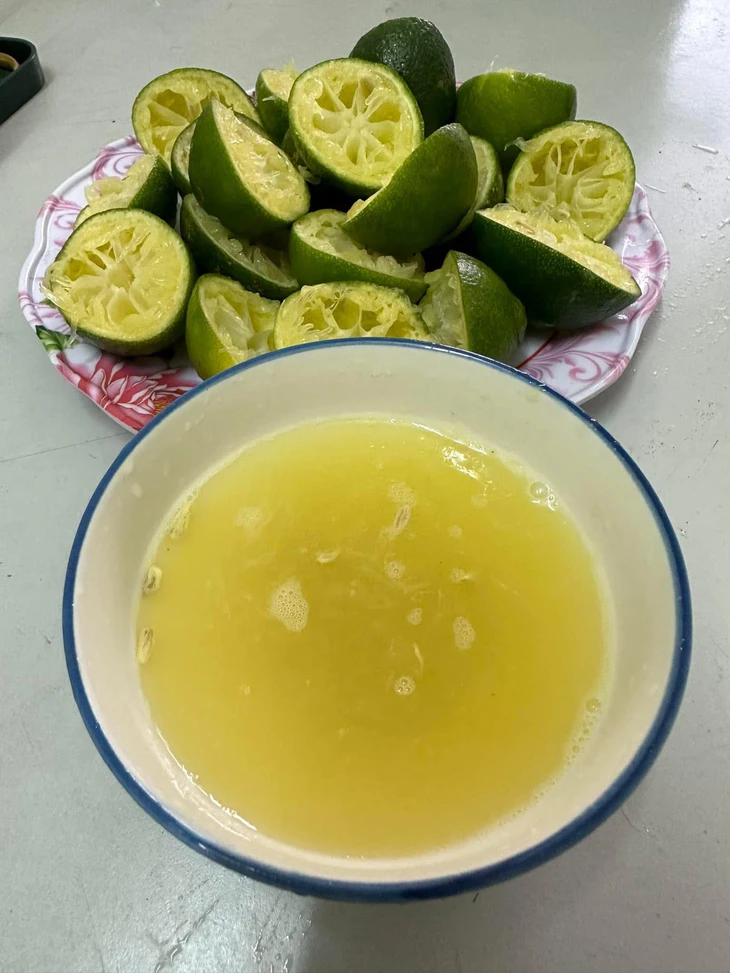
Many people share how to drink lemon juice in the morning to cure diseases - Illustration photo
The appeal of a “natural therapy”
According to Dr. Nguyen Huy Hoang - Vietnam - Russia Hyperbaric Oxygen Center, Ministry of National Defense , drinking lemon water - especially pure lemon juice - every morning is becoming a popular trend on social networks and health care promotion platforms.
With the promise of “detoxification”, “weight loss”, “skin beautification” or “immunity enhancement”, many people choose this habit without careful medical consideration.
The outstanding feature of lemon juice is that it contains low calories but is rich in beneficial substances such as vitamin C. One lemon provides 20-50mg of vitamin C, supports immunity, and protects cells from oxidation.
Citric acid makes up 5-6% of the juice, helping to prevent kidney stones and absorb minerals.
Potassium, flavonoids and polyphenols, which have roles in regulating blood pressure and anti-inflammation.
However, filtered lemon juice no longer contains fiber, losing the benefits of creating a feeling of fullness or stabilizing blood sugar.
Accordingly, lemon helps boost immunity thanks to vitamin C and flavonoids. Prevents calcium oxalate kidney stones because citric acid increases the amount of citrate in urine, preventing crystal formation.
Increase iron absorption as vitamin C and citric acid help absorb non-heme iron from plants, preventing anemia.
In addition, lemon also helps beautify the skin, supports collagen synthesis, is an antioxidant; supports hydration - especially effective when diluted. Can help reduce calories indirectly when replacing soft drinks with diluted lemon juice.
“However, benefits such as “liver detoxification”, “fat burning” or “blood alkalization” have never been scientifically confirmed,” Dr. Hoang shared.
Risks of using lemon juice every day
According to Dr. Hoang, the first risk is that it causes tooth enamel to corrode. Citric acid dissolves tooth enamel, leading to tooth sensitivity, yellow teeth, and cavities. The risk is higher when drinking it straight, without a straw, or before brushing your teeth.
Second, it can cause irritation to the digestive tract. Especially for people with gastroesophageal reflux disease (GERD), stomach ulcers. Drinking on an empty stomach can easily cause heartburn and nausea.
Third is the effect on the kidneys, especially people with kidney disease need to limit potassium, can have problems if drinking too much. Some studies also doubt the effect on urine pH.
In addition, drinking lemon juice every day can cause migraines due to tyramine in lemons; cause mouth ulcers, increased sensitivity to sunlight (if used on the skin) due to acidity and light-sensitive compounds.
In particular, lemon juice can cause drug interactions, because citric acid and limonene can affect the metabolism of drugs such as warfarin (anticoagulant), statin (lipid-lowering drug), itraconazole (antifungal drug), etc.
How to drink lemon juice?
According to this expert, given the risks of drinking lemon juice, diluting lemon juice is clearly safer. It is not recommended to use pure lemon juice every day.
Instead, dilute lemon juice by mixing 1/4-1/2 lemon with 240-300ml of water; preferably drink with a straw to avoid contact with teeth; rinse your mouth after drinking, wait 30-60 minutes before brushing your teeth.
In particular, do not drink on an empty stomach if you have stomach problems. Do not drink more than 1-2 glasses/day.
Consult your doctor if you have an underlying medical condition or are taking medication.
In addition, some people should avoid using lemon juice regularly such as people with stomach ulcers, chronic kidney disease, taking medications that interact with lemon, tooth enamel erosion, and people allergic to citrus fruits.
“Drinking diluted lemon juice can be a useful part of a healthy diet if done properly. On the contrary, the habit of drinking pure lemon juice every day has many potential risks, especially for teeth and digestion,” Dr. Hoang warned.
Source: https://tuoitre.vn/trend-uong-nuoc-cot-chanh-suc-hut-tu-lieu-phap-tu-nhien-tiem-an-nhieu-rui-ro-20250502104231153.htm


![[Photo] Editor-in-Chief of Nhan Dan Newspaper Le Quoc Minh received the working delegation of Pasaxon Newspaper](https://vphoto.vietnam.vn/thumb/1200x675/vietnam/resource/IMAGE/2025/9/23/da79369d8d2849318c3fe8e792f4ce16)
![[Photo] The 1st Congress of Party Delegates of Central Party Agencies, term 2025-2030, held a preparatory session.](https://vphoto.vietnam.vn/thumb/1200x675/vietnam/resource/IMAGE/2025/9/23/e3a8d2fea79943178d836016d81b4981)


![[Photo] Prime Minister Pham Minh Chinh chairs the 14th meeting of the Steering Committee on IUU](https://vphoto.vietnam.vn/thumb/1200x675/vietnam/resource/IMAGE/2025/9/23/a5244e94b6dd49b3b52bbb92201c6986)
![[Photo] General Secretary To Lam meets voters in Hanoi city](https://vphoto.vietnam.vn/thumb/1200x675/vietnam/resource/IMAGE/2025/9/23/d3d496df306d42528b1efa01c19b9c1f)





















































































Comment (0)